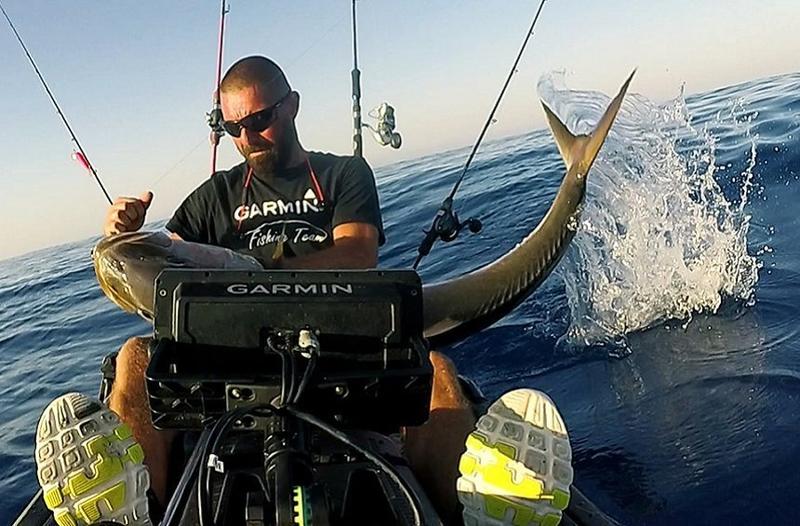
Kayak fishing is an activity that allows fishermen to make their way out into the open sea, 2 to 3 kilometers from the coast, where they can be in direct contact with the elements of nature while fishing.
Aggelos Kouriefs sought out the sport as a way to escape from everyday routine. He explains: “My aim is not to bring fish home daily. After all, there is truth to the saying that goes ‘a hunter and a fisherman’s plate is 10 times empty, and full just once.’”
As an active member of a growing community of specialized fishermen, Aggelos says: “We are a new generation of fishermen who are interested in watching and studying marine life, being informed by the reports of the Department of Fisheries, and giving our own feedback from our experiences in return.”

The greatest pleasure is the sense of freedom at being in the open waters, and the serenity of the sea, as well as the opportunity to discover all that lies beneath its surface.
Every 3 months or so – around the same time that the seasons change – the types of fish one finds in the open sea also varies (from aberjacks and litcha fish, to newcomer lionfish). Fish populations have changed significantly with the invasion of large schools of lionfish and rabbitfish. “Lionfish are an especially aggressive species towards other fish, as they feed on them.”
Returning caught fish to the water before they die is a practice that is increasingly followed by newer fishermen.
“If a fisherman carefully removes the hook from the fish’s mouth (the most capable of them can remove the hook even if it has pierced the fish’s esophagus), then the fish can return to the water, its wound will heal, and it will continue to live,” Aggelos notes, adding that this is something that he himself does if he happens to catch a leerfish, which is a challenge to catch due to its large weight (he has caught such fish up to 45kg), but also due to its muscular strength and resistance. “Leerfish are not that tasty, so I let them go, just as I do if I happen to catch a fish that exceeds the weight limits of my license as an amateur fisherman.”

“The point is not just for us to have fun, but to make sure that there'll still be fish tomorrow, so the balance of marine life is maintained, and the next generations continue to recognize these species.”
“With the technology we have at our disposal, we could clean out the entire sea in days and not leave a single scale or fin behind. This is not the point, however. The pleasure we get from this activity is not just the moment we pull the fish out of the water. It’s the whole process – the preparation of the equipment, rowing the kayak, the contact with the sea,” concludes Aggelos.
A kayak, without the equipment, ranges between €1.300 - €3.300, and all are specially designed to serve the needs of fishermen, who can choose a motorized vessel or one with paddles.
Equipment:
Ocean Kayak: 99 681819
A. Stylianides Hunting & Fishing: 77 772025